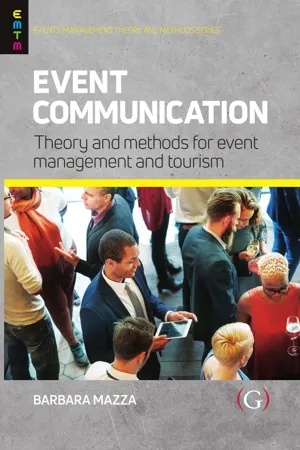
- 256 pages
- English
- ePUB (mobile friendly)
- Available on iOS & Android
About this book
Effective communication is vital in event management. Event Communication: Theory and Methods for Event Management focuses attention on communication studies as applied to Event Management, through the whole event mamangment process. It pays particular attention to the latest technological innovations with the event industry including virtual events and digital technologies. With a wealth of case studies and examples of best practice, is explains the communication process covering issues such as: •Relationship and integrated communication for the event stakeholder management•Event mix strategies and multilevel communication•Different typologies of users and consumer behaviour•Communication planning and results•Events storytelling: dramaturgy and metacommunication•How to increase engagement and deliver immersive experiences•Innovative digital technologies and virtual events•Evaluating event communication The Event Management Theory and Methods Series examines the extent to which mainstream theory is employed to develop event-specific theory, and to influence the very core practices of event management and event tourism. Each compact volume contains overviews of mainstream management theories and methods, examples from the events literature, case studies, and guidance on all aspects of planned-event management. The series introduces the theory, shows how it is being used in the events sector through a literature review, incorporates examples and case studies written by researchers and/or practitioners, and contains methods that can be used effectively in the real world.Series editors: Donald Getz PhD., Professor Emeritus, University of Calgary, Canada and Vassilios Ziakas, PhD., is Consultant & Independent Scholar, UK.Barbara Mazza is Associate Professor (Roma, Italy) in the Department of Communication and Social Research of the Sapienza University of Rome, where teaches Communication for Business Management and Event Management and Communication. Department of Communication and Social Research, Sapienza, University of Rome.
Frequently asked questions
- Essential is ideal for learners and professionals who enjoy exploring a wide range of subjects. Access the Essential Library with 800,000+ trusted titles and best-sellers across business, personal growth, and the humanities. Includes unlimited reading time and Standard Read Aloud voice.
- Complete: Perfect for advanced learners and researchers needing full, unrestricted access. Unlock 1.4M+ books across hundreds of subjects, including academic and specialized titles. The Complete Plan also includes advanced features like Premium Read Aloud and Research Assistant.
Please note we cannot support devices running on iOS 13 and Android 7 or earlier. Learn more about using the app.
Information
Table of contents
- Prelims
- 1 Integrated communication for events
- 2 Mixed event strategies and multilevel communication
- 3 Event participants
- 4 Communication: Planning and results
- 5 Event communication design
- 6 From experience to engagement
- 7 The digital disruption
- 8 Evaluating the impact of event communication
- Conclusions
- Index